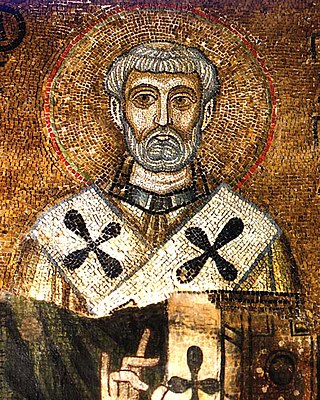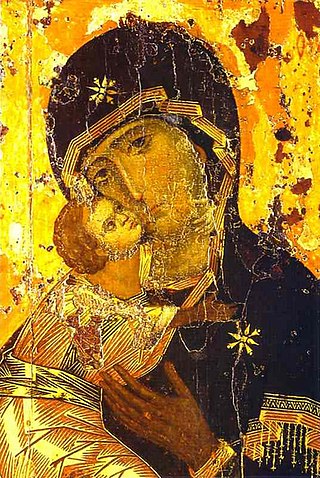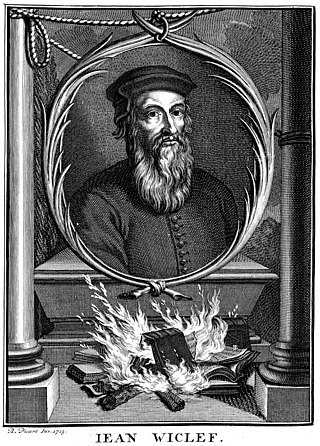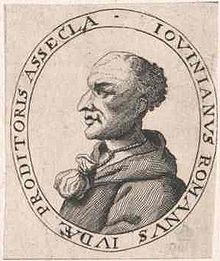Arianism is a Christological doctrine considered heretical by all modern mainstream branches of Christianity. It is first attributed to Arius, a Christian presbyter who preached and studied in Alexandria, Egypt. Arian theology holds that Jesus Christ is the Son of God, who was begotten by God the Father with the difference that the Son of God did not always exist but was begotten/made before time by God the Father; therefore, Jesus was not coeternal with God the Father, but nonetheless Jesus began to exist outside time.

Montanism, known by its adherents as the New Revelation, was an early Christian movement of the late 2nd century, later referred to by the name of its founder, Montanus. Montanism held views about the basic tenets of Christian theology similar to those of the wider Christian Church, but it was labelled a heresy for its belief in new prophetic figures. The prophetic movement called for a reliance on the spontaneity of the Holy Spirit and a more conservative personal ethic.

Clement of Rome, also known as Pope Clement I, was the bishop of Rome in the late first century AD. He is considered to be the first of the Apostolic Fathers of the Church, and a leading member of the Church in Rome in the late 1st century.

Hilary of Poitiers was Bishop of Poitiers and a Doctor of the Church. He was sometimes referred to as the "Hammer of the Arians" and the "Athanasius of the West". His name comes from the Latin word for happy or cheerful. In addition to his important work as bishop, Hilary was married and the father of Abra of Poitiers, a nun and saint who became known for her charity.
Priscillianism was a Christian sect developed in the Roman province of Hispania in the 4th century by Priscillian. It is derived from the Gnostic doctrines taught by Marcus, an Egyptian from Memphis. Priscillianism was later considered a heresy by both the Eastern Orthodox Church and the Roman Catholic Church.

Marriage in the Catholic Church, also known as holy matrimony, is the "covenant by which a man and woman establish between themselves a partnership of the whole of life and which is ordered by its nature to the good of the spouses and the procreation and education of offspring", and which "has been raised by Christ the Lord to the dignity of a sacrament between the baptized". Catholic matrimonial law, based on Roman law regarding its focus on marriage as a free mutual agreement or contract, became the basis for the marriage law of all European countries, at least up to the Reformation.

The perpetual virginity of Mary is a Christian doctrine that Mary, the mother of Jesus, was a virgin "before, during and after" the birth of Christ. In Western Christianity, the Catholic Church adheres to the doctrine, as do some Lutherans, Anglicans, Reformed, and other Protestants. In Eastern Christianity, the Oriental Orthodox Churches and the Church of the East both adhere to this doctrine as part of their ongoing tradition, and Eastern Orthodox churches recognize Mary as Aeiparthenos, meaning "ever-virgin". It is one of the four Marian dogmas of the Catholic Church. Most modern nonconformist Protestants reject the doctrine.

Jovinian was an opponent of Christian asceticism in the 4th century and was condemned as a heretic at synods convened in Rome under Pope Siricius and in Milan by Ambrose in 393 because of his views. Our information about him is derived principally from the work of Jerome in two books, Adversus Jovinianum. Jerome referred to him as the "Epicurus of Christianity". He was a native of Corduene, in present day Turkey. John Henry Newman called Aerius of Sebaste, Jovinian and Vigilantius the forerunners of Protestantism, likening them to the "Luther, Calvin, and Zwingli of the fourth century". Other Protestants also praise Jovinian as an early reformer or even credit him as the "first Protestant". Jovinian's teachings received much popular support in Rome and Milan and his followers Sarmatio and Barbatianus kept preaching his ideas after Jovinian was expelled.
Vigilantius the Christian presbyter, wrote a work, no longer extant, which opposed a number of common 5th-century practices, and which inspired one of the most violent of the polemical treatises of Jerome. Vigilantius was born about 370 at Calagurris in Aquitania, where his father kept an inn on the great Roman road from Gallia Aquitania to Spain. While still a youth his talent became known to Sulpicius Severus, who had estates in that neighborhood, and in 395 Sulpicius, who probably baptized him, sent him with letters to Paulinus of Nola, where he met with a friendly reception. Some Protestant historians regard Vigilantius, along with Jovinian, Aerius of Sebaste and Helvidius, as 4th-5th century early proto-protestants.
Against Jovinianus is a two-volume treatise by the Church Father Saint Jerome.
Heresy in Christianity denotes the formal denial or doubt of a core doctrine of the Christian faith as defined by one or more of the Christian churches.
Helvidius was the author of a work written prior to 383 against the belief in the perpetual virginity of Mary. Helvidius maintained that the biblical mention of "sisters" and "brothers" of the Lord constitutes solid evidence that Mary had normal marital relations with Joseph and additional children after the miraculous conception and birth of Jesus. He supported his opinion by the writings of Tertullian and Victorinus. Helvidius is sometimes seen as an early proto-protestant, along with Vigiliantius, Jovinian and Aerius of Sebaste.
Aerius of Pontus was a 4th-century presbyter of Sebaste in Pontus. He taught doctrines that were in opposition to 4th-5th century Christian beliefs. His views are known from St Epiphanius's Panarion in which he was accused of being an Arian. For a short period, he had many followers in Sebaste. He failed to make his teachings widely popular and his sect died out soon after his death. Aerius of Sebaste is sometimes seen as an early proto-protestant, along with Jovinian, Helvidius and Vigiliantius.

Disciplina arcani was a custom that prevailed in the 4th and 5th centuries of Christianity, whereby knowledge of certain doctrines and rites of the Christian religion was kept from non-Christians and even from those who were undergoing instruction in the faith so that they may progressively learn the teachings of the faith and not fall to heresy due to simplistic misunderstandings.
The church invisible, invisible church, mystical church or church mystical, is a Christian theological concept of an "invisible" Christian Church of the elect who are known only to God, in contrast to the "visible church"—that is, the institutional body on earth which preaches the gospel and administers the sacraments. Every member of the invisible church is "saved", while the visible church contains all individuals who are saved though also having some who are "unsaved". According to this view, Bible passages such as Matthew 7:21–27, Matthew 13:24–30, and Matthew 24:29–51 speak about this distinction.
In the year before the Council of Constantinople in 381, Christianity became the official religion of the Roman Empire when Emperor Theodosius I issued the Edict of Thessalonica in 380, which recognized the catholic orthodoxy of Nicene Christians as the Roman Empire's state religion. Historians refer to the Nicene church associated with emperors in a variety of ways: as the catholic church, the orthodox church, the imperial church, the Roman church, or the Byzantine church, although some of those terms are also used for wider communions extending outside the Roman Empire. The Eastern Orthodox Church, Oriental Orthodoxy, and the Catholic Church all claim to stand in continuity from the Nicene church to which Theodosius granted recognition.

The Church Fathers, Early Church Fathers, Christian Fathers, or Fathers of the Church were ancient and influential Christian theologians and writers who established the intellectual and doctrinal foundations of Christianity. The historical period in which they worked became known as the Patristic Era and spans approximately from the late 1st to mid-8th centuries, flourishing in particular during the 4th and 5th centuries, when Christianity was in the process of establishing itself as the state church of the Roman Empire.

Proto-Protestantism, also called pre-Protestantism, refers to individuals and movements that propagated various ideas later associated with Protestantism before 1517, which historians usually regard as the starting year for the Reformation era. The relationship between medieval sects and Protestantism is an issue that has been debated by historians.
Sarmatio was a 4th-century monk in Milan and a disciple of Jovinian, who disputed the merits of the monastic and unmarried life. Sarmatio first met Jovinian when he travelled to Milan, where Jovinian found two monks of a similar mind, Sarmatio and Barbatianus. After Jovinian was expelled from Milan, Sarmatio kept doing work in Vercellae where he gathered a considerable following and public support; in response, Ambrose, the bishop of Milan, started defending ascetism. The views Sarmatio was preaching were condemned in the Synod of Milan.
Barbatinus was a 4th-century early Church theologian and a Jovinianist. Barbatianus disputed the merit of the unmarried life and opposed ascetism. Barbatianus along with Sarmatio met Jovinian when he travelled to Milan and found themselves to have similar ideas.










